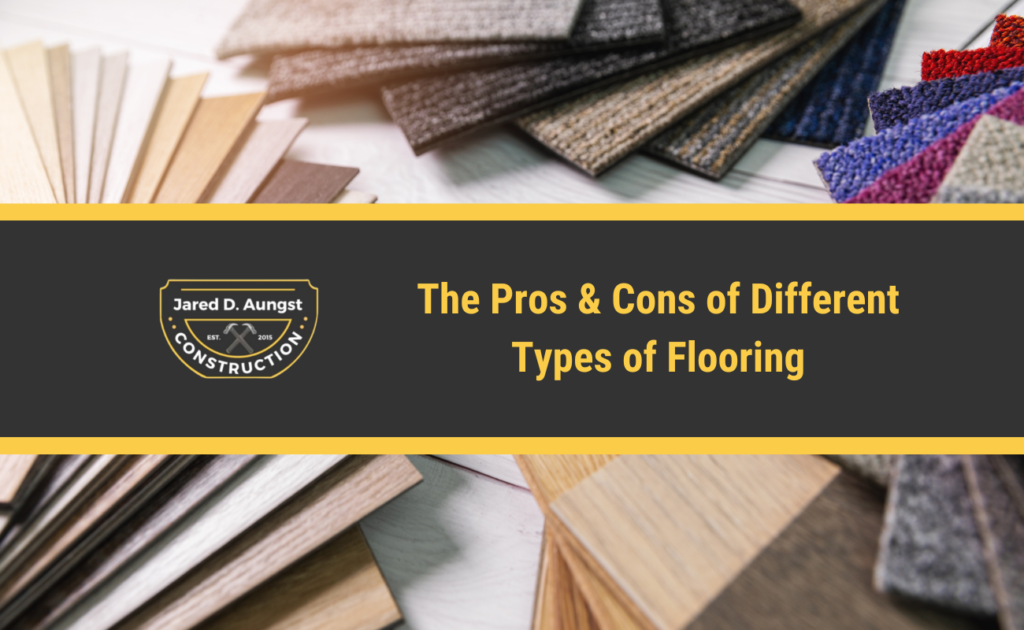Types Of Flooring Pros And Cons
Your choice in flooring is crucial to the functionality and aesthetics of your home. With so many options available, knowing the benefits and drawbacks of different types – carpet, vinyl, tile, and hardwood – can help you decide which flooring is right for your home. The professional contractors at Jared D. Aungst Construction install all types of flooring to meet your wants and needs. Allow us to help you understand which type of flooring may work best for your living space.
The Benefits and Drawbacks of Carpeting
Carpets are great for those looking for soft, warm floors. Their soft texture offers a cushioned surface that can add a cozy feel to homes – especially in family rooms, living areas, and bedrooms. Carpeting also absorbs sound, which makes it perfect for homes with children. With a wide range of colors, patterns, and textures, carpet flooring allows homeowners to personalize their floors to their specific style.
Like all types of flooring, carpet requires regular upkeep. It easily traps dust, allergens, and pet hair, which calls for regular vacuuming and occasional deep cleaning to keep it looking and feeling nice. Additionally, carpeting is susceptible to staining and high levels of wear and tear that can dull its appearance over time. Carpets may require more frequent replacement than other flooring options due to their relatively shorter lifespan, particularly if it is installed in an area of your home with heavy foot traffic.
Pros and Cons of Tile Flooring
Tile flooring – which includes ceramic, porcelain, and natural stone tile – is known for its durability and long lifespan. It is a sensible option for high traffic areas and damp environments, like kitchens and bathrooms, because it stands up well to dents, scratches, and stains. Cleaning and maintaining tile floors is quite simple – regular sweeping and mopping is usually adequate. Additionally, tiles come in a wide range of styles, sizes, and finishes, offering limitless design options to match the style of your home.
The main drawback of tile flooring is that it can be cold and uncomfortable beneath your feet, which isn’t desirable in areas of your home like living rooms or bedrooms. Some homeowners opt for underfloor heating or area rugs to combat the cold of the tile, but these both increase the overall cost of installing or replacing your floors. Tile installation can also be costly, especially when complex patterns and premium materials are used. The grout between tiles can become discolored or stained over time, requiring regular cleaning or resealing to keep it looking nice.
The Positives and Negatives of Vinyl Flooring
Vinyl flooring is favored for its practicality and cost-effectiveness. When compared to other flooring options, it is much more affordable and is highly resistant to moisture, making it a great flooring choice for areas like kitchens and bathrooms where spills and humidity are common. Another positive of vinyl flooring is the ease of installation. Many vinyl flooring options are designed for straight-forward installation and simple home renovation projects.
Despite these benefits, vinyl flooring has a few drawbacks. Even though it is water resistant, it is very susceptible to dents and scratches, especially when lower-quality materials are used. Visible damage can occur from heavy furnishings, like dining tables and chairs, as well. As a synthetic product, vinyl flooring is less environmentally friendly than natural flooring options, and disposal can be difficult if the flooring is not recyclable. Even though modern vinyl flooring can resemble natural materials, it may not have the same texture or aesthetic appeal as genuine stone or wood flooring.
Advantages and Disadvantages of Hardwood Floors
Hardwood floors are valued for their timeless beauty and natural warmth. These floors add value and elegance to any area of your home, and come in a variety of wood species, finishes, and styles to suit different home aesthetics. Another significant advantage of hardwood floors is its durability; with proper maintenance, high-quality hardwood floors can survive for decades and be refinished numerous times to retain their original appearance. This makes hardwood flooring a long-term investment in both style and functionality.
However, hardwood flooring is often much more expensive than alternative flooring options. Costs for materials and installation can be significant, particularly when it comes to premium wood. Upkeep is also particularly important since, despite its durability, hardwood is prone to dents, scratches, and moisture damage. Maintaining the elegant look of hardwood floors requires careful cleaning and refinishing on a regular basis. Additionally, wood’s inherent expansion and contraction in response to temperature and humidity changes can cause gaps or warping if not managed correctly.
Which Type Of Flooring Is Best For Your Living Space?
Each type of flooring has a special set of advantages and disadvantages. The ideal flooring option for your space will ultimately depend on your personal preferences, budget constraints, and specific needs. Working with a local flooring contractor can help you decide which type of flooring will best suit your needs. Contact your local flooring contractors at Jared D. Aungst Construction for a free quote on your flooring project today.

